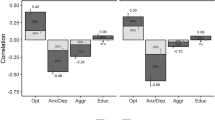Abstract
The Eysenck Personality Questionnaire was administered to 1400 Australian twin pairs aged 11 to 18, and the data were analyzed by a multivariate normal model using the software FISHER. For each scale, attempts were made to transform to normality, about a mean modeled separately for each sex as a quadratic function of age. Variances and covariances were estimated for each sex-zygosity group as a monotone function of age. Evidence for genetic sources of variation were assessed in part by fitting models which allowed for age-dependent, sex-specific, and correlated additive genetic factors, and age-dependent and sex-specific environmental factors, under the assumption that effects of environmental factors common to twin pairs are independent of zygosity. Evidence for genetic factors independent of age and sex was most compelling for Psychoticism and Neuroticism. For Extraversion, if genetic factors exist they would be mostly sex-specific and age-dependent. For the Lie scale there was evidence for, at most, a small component of genetic variation.
Similar content being viewed by others
References
Akaike, H. (1974). A new look at the statistical model identification.IEEE Trans. Automat. Control AC-19:716–723.
Baker R. J., and Nelder, J. A. (1978).The GLIM System Release 3, Generalized Linear Interactive Modelling, Numerical Algorithms Group, Oxford.
Box, G. E. P., and Cox, D. R. (1964). An analysis of transformations.J. R. Stat. Soc. B. 26:211–252.
Eaves, L. J. (1977). Inferring the causes of human variation.J. R. Stat. Soc. A 140:324–355.
Eaves, L. J., Last, K. A., Young, P. A., and Martin, N. G. (1978). Model-fitting approaches to the analysis of human behaviour.Heredity 41:249–320.
Eaves, L. J., Eysenck, H. J., and Martin, N. G. (1989).Genes, Culture and Personality: An Empirical Approach, Academic Press, London.
Eysenck, H. J. (1952).The Scientific Study of Personality, Routledge & Kegan Paul, London.
Eysenck, S. B. G., and Eysenck, H. J. (1975).Manual of the EPQ (Eysenck Personality Questionnaire), University of London Press, London.
Fisher, R. A. (1918). The correlation between relatives on the supposition of Mendelian inheritance.Trans. R. Soc. Edimb. 52:399–433.
Heath, A. C., and Martin, N. G. (1990). Psychoticism as a dimension of personality: A multivariate genetic test of Eysenck and Eysenck's psychoticism construct.J. Personal. Soc. Psychol. 58:111–121.
Heath, A. C., Jardine, R., Eaves, L. J., and Martin, N. G. (1988). The genetic structure of personality. I. Phenotypic factor structure of the EPQ in an Australian sample.Person. Indiv. Diff. 9:59–67.
Heath, A. C., Jardine, R., Eaves, L. J., and Martin, N. G. (1989a). The genetic structure of personality. II. Genetic item analysis of the EPQ.Person. Indiv. Diff. 10:615–624.
Heath, A. C., Eaves, L. J., and Martin, N. G. (1989b). The genetic structure of personality. III. Multivariate genetic item analysis of the EPQ scales.Person. Indiv. Diff. 10: 877–888.
Hill, D. J., White, V. M., Pain, M. D., and Gardner, G. J. (1990). Tobacco and alcohol use among Australian secondary schoolchildren in 1987.Med. J. Aust. 152:124–130.
Hopper, J. L. (1992). The epidemiology of genetic epidemiology.Acta Genet. Med. Gemellol. 41:261–273.
Hopper, J. L. (1993). Variance components for statistical genetics: Applications in medical research to characteristics related to human diseases and health.Stat. Meth. Med. Res. 2:199–223.
Hopper, J. L., and Mathews, J. D. (1982). Extensions to multivariate normal models for pedigree analysis.Ann. Hum. Genet. 46:373–383.
Hopper, J. L., and Mathews, J. D. (1994). A multivariate normal model for pedigree and longitudinal data, and the software ‘FISHER’.Austral. J. Statist. 36:153–176.
Hopper, J. L., White, V. M., Macaskill, G. T., Hill, D. J., and Clifford, C. A. (1992). Alcohol use, smoking habits and the Junior Eysenck Personality Questionnaire in adolescent Australian twins.Acta Genet. Med. Gemellol. 41: 311–324. [See also errata corrigeActa Genet. Med. Gemellol. 42:185 (1993).]
Kaprio, J., Koskenvuo, M., and Rose, R. J. (1990). Change in cohabitation and intrapair similarity of monozygotic (MZ) cotwins for alcohol use, extraversion, and neuroticism.Behav. Genet. 20:265–276.
Lange, K., Westlake, J., and Spence, M. A. (1976). Extensions to pedigree analysis. III. Variance components by the scoring method.Ann. Hum. Genet. 39:485–491.
Lange, K., Boehnke, M., and Weeks, D. (1987).Programs for Pedigree Analysis, Department of Biomathematics, UCLA, Los Angeles.
Rose, R. J., and Kaprio, J. (1988). Frequency and social contact and intra-pair resemblance of adult MZ co-twins: Does shared experience influence personality after all?Behav. Genet. 18:309–328.
Rose, R. J., Kaprio, J., Williams, C. J., Viken, R., and Obremski, K. (1990). Social contact and sibling similarity: Facts, issues, and red herrings.Behav. Genet. 20:763–778.
Viken, R. J., Rose, R. J., Kaprio, J., and Koskenvuo, M. (1994). A developmental genetic analysis of adult personality: Extraversion and neuroticism from 18 to 59 years of age.J. Person. Soc. Psychol. 66:722–730.
Young, P. A., Eaves, L. J., and Eysenck, H. J. (1980). Intergenerational stability and change in the causes of variation in personality.J. Personal. Indiv. Diff. 1:35–55.
Author information
Authors and Affiliations
Rights and permissions
About this article
Cite this article
Macaskill, G.T., Hopper, J.L., White, V. et al. Genetic and environmental variation in Eysenck Personality Questionnaire scales measured on Australian adolescent twins. Behav Genet 24, 481–491 (1994). https://doi.org/10.1007/BF01071561
Received:
Accepted:
Issue Date:
DOI: https://doi.org/10.1007/BF01071561




